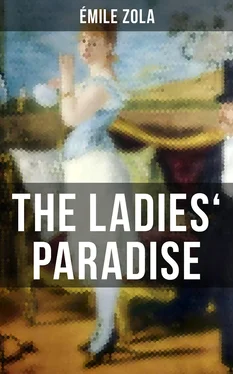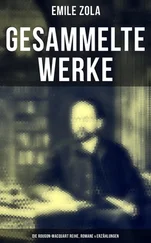“Is your sale still fixed for next Monday?” Madame Marty was just asking.
“Certainly, madame,” replied Mouret, in a soft, sweet voice, an actor’s voice, which he assumed when speaking to women.
Henriette then intervened. “We are all going, you know. They say you are preparing wonders.”
“Oh! wonders!” murmured he, with an air of modest fatuity. “I simply try to deserve your patronage.”
But they pressed him with questions: Madame Bourdelais, Madame Guibal, Blanche even wanted to know.
“Come, give us some details,” repeated Madame de Boves, persistently. “You are making us die of curiosity.”
And they were surrounding him, when Henriette observed that he had not even taken a cup of tea. It was distressing. Four of them set about serving him, but on condition that he would answer them afterwards. Henriette poured it out, Madame Marty held the cup, whilst Madame de Boves and Madame Bourdelais contended for the honor of sweetening it. Then, when he had declined to sit down, and commenced to drink his tea slowly, standing up in the midst of them, they all approached, imprisoning him in the narrow circle of their skirts; and with their heads raised, their eyes sparkling, they sat there smiling at him.
“Your silk, your Paris Paradise, that all the papers are taking about?” resumed Madame Marty, impatiently.
“Oh!” replied he, “an extraordinary article, coarse-grained, supple and strong. You’ll see it, ladies, and you’ll see it nowhere else, for we have bought the exclusive right of it.”
“Really! a fine silk at five francs twelve sous!” said Madame Bourdelais, enthusiastic. “One cannot credit it.”
Ever since the advertisement had appeared, this silk had occupied a considerable place in their daily life. They talked of it, promising themselves some of it, worked up with desire and doubt. And, beneath the gossiping curiosity with which they overwhelmed the young man, there appeared their various temperaments as buyers.
Madame Marty, carried away by her rage for spending, took everything at The Ladies’ Paradise, without choosing, just as the articles appeared; Madame Guibal walked about the shop for hours without ever buying anything, happy and satisfied to simply feast her eyes; Madame de Boves, short of money, always tortured by some immoderate wish, nourished a feeling of rancor against the goods she could not carry away; Madame Bourdelais, with the sharp eye of a careful practical housewife, made straight for the bargains, using the big establishments with such a clever housewife’s skill that she saved a heap of money; and lastly, Henriette, who, very elegant, only procured certain articles there, such as gloves, hosiery, and her coarser linen.
“We have other stuffs of astonishing cheapness and richness,” continued Mouret, with his musical voice. “For instance, I recommend you our Golden Grain, a taffeta of incomparable brilliancy. In the fancy silks there are some charming lines, designs chosen from among thousands by our buyer: and in velvets you will find an exceedingly rich collection of shades. I warn you that cloth will be greatly worn this year; you’ll see our checks and our cheviots.”
They had ceased to interrupt him, and narrowed the circle, their mouths half open with a vague smile, their eager faces close to his, as in a sudden rush of their whole being towards the tempter. Their eyes grew dim, a slight shudder ran through them. All this time he retained his calm, conquering air, amidst the intoxicating perfumes which their hair exhaled; and between each sentence he continued to sip a little of his tea, the aroma of which cooled those sharper odors, in which there was a particle of the savage. Before a captivating grace so thoroughly master of itself, strong enough to play with woman in this way without being overcome by the intoxication which she exhales, Baron Hartmann, who had not ceased to look at him, felt his admiration increasing.
“So cloth will be worn?” resumed Madame Marty, whose ravished face sparkled with coquettish passion.
Madame Bourdelais, who kept a cool lookout, said, in her turn: “Your sale of remnants takes place on Thursday, doesn’t it? I shall wait. I have all my little ones to clothe.” And turning her delicate blonde head towards the mistress of the house: “Sauveur is still your dressmaker, I suppose?”
“Yes,” replied Henrietta, “Sauveur is very dear, but she is the only one in Paris who knows how to make a bodice. Besides, Monsieur Mouret may say what he likes, she has the prettiest designs, designs that are not seen anywhere else. I can’t bear to see my dresses on every woman’s back.”
Mouret smiled discreetly at first. Then he intimated that Madame Sauveur bought her material at his shop; no doubt she went to the manufacturers direct for certain designs of which she acquired the sole right of sale: but for all black silks, for instance, she watched for The Paradise bargains, laying in a considerable stock, which she disposed of at double and treble the price she gave.
“Thus I am quite sure her buyers will snap up all our Paris Paradise. Why should she go to the manufacturers and pay dearer for this silk than she would at my place? On my word of honor, we shall sell it at a loss.”
This was a decisive blow for the ladies. The idea of getting goods below cost price awoke in them all the greed felt by women, whose enjoyment as buyers is doubled when they think they are robbing the tradesman. He knew them to be incapable of resisting anything cheap.
“But we sell everything for nothing!” exclaimed he gaily, taking up Madame Desforges’s fan, which was behind him on the table. “For instance, here’s this fan. I don’t know what it cost.”
“The Chantilly lace was twenty-five francs, and the mounting cost two hundred,” said Henriette.
“Well, the Chantilly isn’t dear. However, we have the same at eighteen francs; as for the mount, my dear madame, it’s a shameful robbery. I should not dare to sell one like it for more than ninety francs.”
“Just what I said!” exclaimed Madame Bourdelais.
“Ninety francs!” murmured Madame de Boves; “one must be very poor indeed to go without one at that price.”
She had taken up the fan, and was again examining it with her daughter Blanche; and, on her large regular face, in her big sleepy eyes, there arose an expression of the suppressed and despairing longing of a caprice in which she could not indulge. The fan once more went the round of the ladies, amidst various remarks and exclamations. Monsieur de Boves and Vallagnosc, however, had left the window. Whilst the former had returned to his place behind Madame Guibal, the charms of whose bust he was admiring, with his correct and superior air, the young man was leaning over Blanche, endeavoring to find something agreeable to say.
“Don’t you think it rather gloomy, mademoiselle, this white mount and black lace?”
“Oh,” replied she, gravely, not a blush coloring her inflated cheeks, “I once saw one made of mother-of-pearl and white lace. Something truly virginal!”
Monsieur de Boves, who had doubtless observed the heartbroken, longing looks with which his wife was following the fan, at last added his word to the conversation. “These flimsy things don’t last long, they soon break,” said he.
“Of course they do!” declared Madame Guibal, with an air of indifference. “I’m tired of having mine mended.”
For several minutes, Madame Marty, excited by the conversation, was feverishly turning her red leather bag about on her lap, for she had not yet been able to show her purchases. She was burning to display them, with a sort of sensual desire; and, suddenly forgetting her husband’s presence, she took out a few yards of narrow lace wound on a piece of cardboard.
Читать дальше












